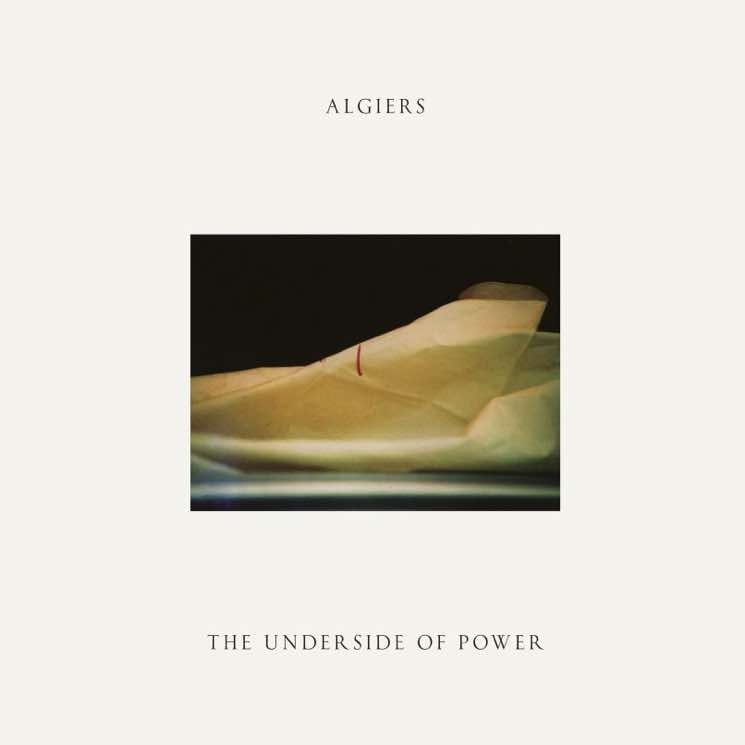Algiers' latest album was formulated while the band was in diaspora, spread out between London, New York and Atlanta and experiencing the world's recent events from slightly different vantage points. With many of the lyrics written from the confines of lead-singer Franklin James Fisher's place of employment (a frustrating Manhattan dance club's coat checkroom), the songs from The Underside of Power are highly volatile rebuttals to the current British and American political climates that encourage xenophobia and fear.
With intimate views of both the Trump presidency and the Brexit decision, Algiers were in the unique position of observing two pivotal political eras simultaneously. And while it could be argued that writing your sophomore LP on two separate continents is counter-intuitive to the creative process, the quartet pulled it off seamlessly. Working with Portishead's Adrian Utley and adding Matt Tong (Bloc Party) on drums, Algiers have managed to create a dizzying tapestry of sounds that incorporates wavy synths, industrial fuzz and gospel choirs into a protest record that embodies the key stages of grief.
Unabashed and unafraid, Algiers cite the Black Panthers and the Chicano movement as inspirations; listeners need look no further than first track "Walk Like a Panther" for evidence. Opening with murdered Panther Fred Hampton orating over layers of distorted guitar, Fisher's soulful voice then hits like a hammer, his words a rejection of the reality that we have moved backwards.
Raised in Atlanta, the multi-racial band were witnesses to stark race oppression. Fisher's outstanding voice alone acts as a barometer for the frustration embedded in these songs, and his efforts are often emboldened by the support of a choir. Nowhere is this more effective than on the title track, where Fisher's soaring voice is lifted by a choral updraft over a soul-clap beat. A mix between Motown and indie, "The Underside of Power" is another in a recent line of political genre-bending tunes made by prominent artist like Michael Kiwanuka and Childish Gambino that are both conscientious and accessible; it provides the template for all 12 tracks on this album.
Algiers shift to anger on "Cleveland," a song that addresses the very disturbing history of racial violence in the South while also naming its victims. Anger proceeds to bargaining and depression on the instrumental "Bury Me Standing," a muddled ambient soundscape of cryptic groaning and dissonant sax playing, only to arrive at acceptance on final track "The Cycle/The Spiral: Time to Go Down Slowly." Acceptance, however, comes in the form of a resurgent jazz and piano number that faces the truth of our time and the cyclical nature of human progression, an understanding that instability is temporary and forward motion requires sustained effort.
The whole record holds a mirror up to society and asks the question: What do we want from our leaders, and ourselves? It's a difficult request often ignored in popular music, but it's a vital one for these turbulent times.
(Matador Records)With intimate views of both the Trump presidency and the Brexit decision, Algiers were in the unique position of observing two pivotal political eras simultaneously. And while it could be argued that writing your sophomore LP on two separate continents is counter-intuitive to the creative process, the quartet pulled it off seamlessly. Working with Portishead's Adrian Utley and adding Matt Tong (Bloc Party) on drums, Algiers have managed to create a dizzying tapestry of sounds that incorporates wavy synths, industrial fuzz and gospel choirs into a protest record that embodies the key stages of grief.
Unabashed and unafraid, Algiers cite the Black Panthers and the Chicano movement as inspirations; listeners need look no further than first track "Walk Like a Panther" for evidence. Opening with murdered Panther Fred Hampton orating over layers of distorted guitar, Fisher's soulful voice then hits like a hammer, his words a rejection of the reality that we have moved backwards.
Raised in Atlanta, the multi-racial band were witnesses to stark race oppression. Fisher's outstanding voice alone acts as a barometer for the frustration embedded in these songs, and his efforts are often emboldened by the support of a choir. Nowhere is this more effective than on the title track, where Fisher's soaring voice is lifted by a choral updraft over a soul-clap beat. A mix between Motown and indie, "The Underside of Power" is another in a recent line of political genre-bending tunes made by prominent artist like Michael Kiwanuka and Childish Gambino that are both conscientious and accessible; it provides the template for all 12 tracks on this album.
Algiers shift to anger on "Cleveland," a song that addresses the very disturbing history of racial violence in the South while also naming its victims. Anger proceeds to bargaining and depression on the instrumental "Bury Me Standing," a muddled ambient soundscape of cryptic groaning and dissonant sax playing, only to arrive at acceptance on final track "The Cycle/The Spiral: Time to Go Down Slowly." Acceptance, however, comes in the form of a resurgent jazz and piano number that faces the truth of our time and the cyclical nature of human progression, an understanding that instability is temporary and forward motion requires sustained effort.
The whole record holds a mirror up to society and asks the question: What do we want from our leaders, and ourselves? It's a difficult request often ignored in popular music, but it's a vital one for these turbulent times.
